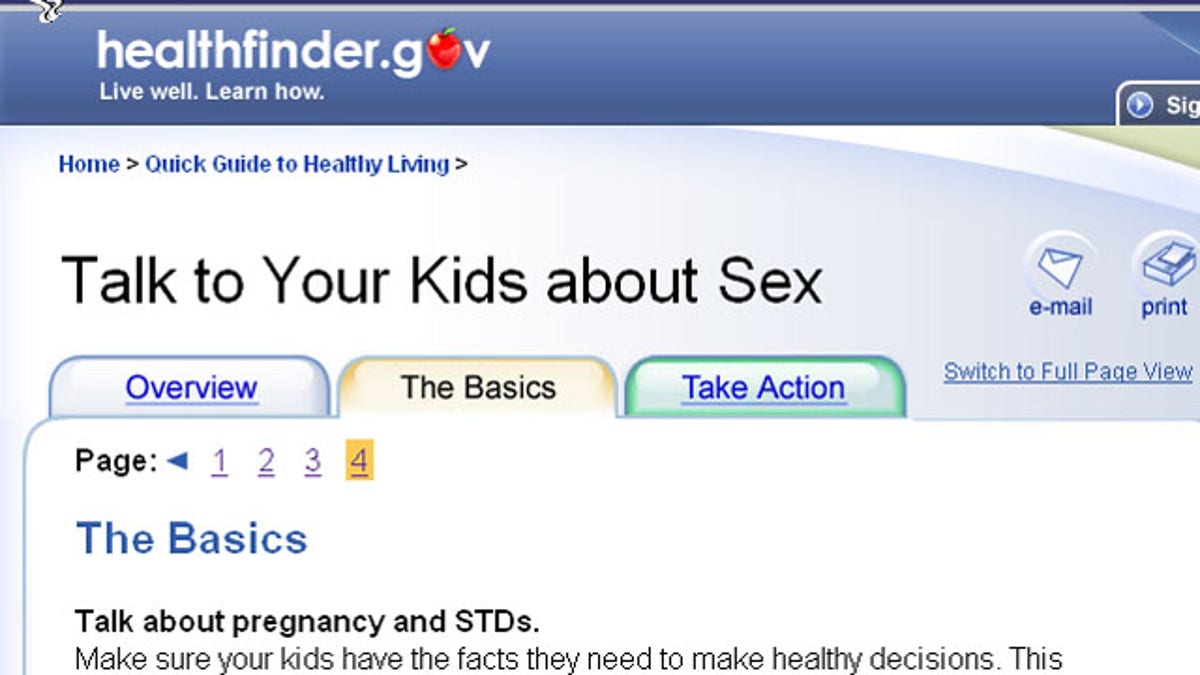
Shown here is a health guide on the Department of Health and Human Services website. (Department of Health and Human Services)
Children are "sexual beings" who shouldn't be discouraged from touching themselves unless it gets out of hand, according to parenting guidelines linked from a federal health website.
The site also says teenagers may "experiment" sexually with members of the same sex regardless of whether they are gay or straight.
The guidelines have drawn criticism from the conservative Family Research Council, which says the language rests on some "discredited" concepts about children.
"The fact that children are aware of their bodies and they touch their bodies ... does not mean that they are 'sexual beings,'" said Peter Sprigg, the council's senior fellow for policy studies. He said the claim provides "the philosophical foundation for pedophilia."
However, a spokesman with the Department of Health and Human Services noted that the guidelines are contained on a "non-federal website," and pointed to an HHS disclaimer.
The disclaimer on the HHS site states: "Linking to a non-federal site does not constitute an endorsement by HHS or any of its employees of the sponsors or the information and products presented on the site."
The controversial child wellness tips are included not on the HHS site itself but as part of a question-and-answer section on the website KidsHealth, a subsidiary of a nonprofit focused on children's health. The link to that site is included in the Department of Health and Human Services' "Quick Guide to Healthy Living," under the "talk to your kids about sex" section.
The KidsHealth guide goes into detail about when children start becoming curious about sex.
"Children are human beings and therefore sexual beings," it says, adding that "even infants" are curious about their bodies. The guide does not clearly state when that curious touching can be regarded as sexual, but urges parents not to scold their children.
"Parents can make it clear that they expect the child to keep that activity private," the guide says. "Parents should only be concerned about masturbation if a child seems preoccupied with it to the exclusion of other activities."
A separate section in the guide says it is "quite common" for teens to think sexually about members of the same and opposite sex. The guide says these thoughts, and corresponding actions, don't necessarily demonstrate whether a teen is gay or straight.
"Some teens may also experiment with sexual experiences, including those with members of the same sex, during the years they are exploring their own sexuality. These experiences, by themselves, do not necessarily mean that a teen is gay or straight," the guide says.
The guide offers a number of tips for how parents should broach the topic of sex with their children. One section urges parents to use a "media cue, like a TV program or an article in the paper," to bring up the subject.
Sprigg said the guide includes some useful advice for parents, including about the right to privacy and "good touch, bad touch" boundaries children should set with their bodies. He said the advice about teen experimentation is "valuable," agreeing with the claim that homosexual thoughts and activities do not necessarily mean a person is gay.
But he also said "the idea of sexual experimentation among young people ought to be discouraged."
According to the site, the research was reviewed between 2008 and 2009. It was updated as recently as last week.




